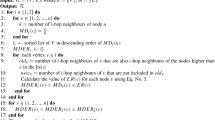Abstract
Influence maximization algorithms in social networks are aimed at mining the most influential TOP-K nodes in the current social network, through which we will get the fastest spreading speed of information and the widest scope of influence by putting those nodes as initial active nodes and spreading them in a specific diffusion model. Nowadays, influence maximization algorithms in large-scale social networks are required to be of low time complexity and high accuracy, which are very hard to meet at the same time. The traditional Degree Centrality algorithm, despite of its simple structure and less complexity, has less satisfactory accuracy. The Closeness Centrality algorithm and the Betweenness Centrality algorithm are comparatively highly accurate having taken global metrics into consideration. However, their time complexity is also higher. Hence, a new algorithm based on Three Degrees of Influence Rule, namely, Linear-Decrescence Degree Centrality Algorithm, is proposed in this paper in order to meet the above two requirements for influence maximization algorithms in large-scale social networks. This algorithm, as a tradeoff between the low accuracy degree algorithm and other high time complexity algorithms, can meet the requirements of high accuracy and low time complexity at the same time.
Access this chapter
Tax calculation will be finalised at checkout
Purchases are for personal use only
Similar content being viewed by others
References
Guo, K.H.: Application of reliability assessment methods of small sample based on Bayes theory. Sci. Tech. Innov. Prod. (2014)
Liu, Q.: Study on the influence of prior reliability for bayesian estimation. In: International Conference on Reliability, Maintainability and Safety, pp. 407–410 (1999)
Maeda, T., Kimura, M.: A Study on Linearized Growth Curve Models for Software Reliability Data Analysis. Ieice Technical Report 106, pp. 21–26 (2006)
Yang, R., Tang, J., Sun, D.: Association rule data mining applications for Atlantic tropical cyclone intensity changes. Weather Forecast. 26, 337–353 (2010)
Norman, A.T., Russell, C.A.: The pass-along effect: investigating word-of-mouth effects on online survey procedures. J. Comput. Mediat. Commun. 11, 1085–1103 (2006)
File, K.M., Cermak, D.S.P., Prince, R.A.: Word-of-mouth effects in professional services buyer behaviour. Serv. Ind. J. 14, 301–314 (1994)
Kempe, D., Kleinberg, J., Tardos, É.: Maximizing the spread of influence through a social network. In: ACM SIGKDD International Conference on Knowledge Discovery and Data Mining, pp. 137–146 (2003)
Chen, D., Shang, M., Lv, Z., Fu, Y.: Detecting overlapping communities of weighted networks via a local algorithm. Phys. A 389, 4177–4187 (2010)
Vanderweele, T.J.: Inference for influence over multiple degrees of separation on a social network. Stat. Med. 32, 591 (2013)
Balkew, T., Model, S., Rate, R.R., Analysis, P.P.: The SIR Model When S(t) is a Multi-Exponential Function. Dissertations & Theses - Gradworks 14, 50-50 (2010)
Acknowledgments
This work was funded by the National Natural Science Foundation of China under Grant (No. 61772152 and No. 61502037), the Basic Research Project (No. JCKY2016206B001, JCKY2014206C002 and JCKY2017604C010), and the Technical Foundation Project (No. JSQB2017206C002).
Author information
Authors and Affiliations
Corresponding author
Editor information
Editors and Affiliations
Rights and permissions
Copyright information
© 2018 Springer Nature Switzerland AG
About this paper
Cite this paper
Wang, H., Yin, G., Zhou, L., Chen, X., Zhang, D. (2018). Influence Maximization Algorithm in Social Networks Based on Three Degrees of Influence Rule. In: Sun, X., Pan, Z., Bertino, E. (eds) Cloud Computing and Security. ICCCS 2018. Lecture Notes in Computer Science(), vol 11063. Springer, Cham. https://doi.org/10.1007/978-3-030-00006-6_52
Download citation
DOI: https://doi.org/10.1007/978-3-030-00006-6_52
Published:
Publisher Name: Springer, Cham
Print ISBN: 978-3-030-00005-9
Online ISBN: 978-3-030-00006-6
eBook Packages: Computer ScienceComputer Science (R0)




